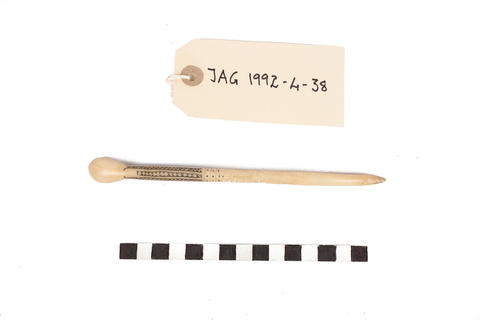Title and statement of responsibility area
Title proper
Snuff spoon (view 2)
General material designation
- Object
Parallel title
Other title information
Title statements of responsibility
Title notes
- Source of title proper: FHYA using JAG materials
Level of description
View
Repository
Reference code
Edition area
Edition statement
Edition statement of responsibility
Class of material specific details area
Statement of scale (cartographic)
Statement of projection (cartographic)
Statement of coordinates (cartographic)
Statement of scale (architectural)
Issuing jurisdiction and denomination (philatelic)
Dates of creation area
Date(s)
-
2017 - (Online curation)
- Online curation
- Five Hundred Year Archive (FHYA)
- Note
- Digital image by Nessa Leibhammer
Physical description area
Physical description
Publisher's series area
Title proper of publisher's series
Parallel titles of publisher's series
Other title information of publisher's series
Statement of responsibility relating to publisher's series
Numbering within publisher's series
Note on publisher's series
Archival description area
Custodial history
Scope and content
Notes area
Physical condition
Immediate source of acquisition
Arrangement
Language of material
Script of material
Location of originals
Availability of other formats
Restrictions on access
Terms governing use, reproduction, and publication
Creative Commons License: CC BY-NC-ND
https://creativecommons.org/licenses/by-nc-nd/3.0/
Unless otherwise stated the copyright of all material on the FHYA resides with the contributing institution/custodian.
Finding aids
Associated materials
Accruals
General note
Description
[Source - Nessa Leibhammer for FHYA using JAG materials, 2017: Snuff spoon, Pondo; Material: Bone, pigment.]
General note
Acquisition
[Source - Nessa Leibhammer for FHYA, 2017: JAG accessioned the item as Pondo (see also Mpondo as part of Cape Nguni as per Van Warmelo’ s classifications). In the 1840s 50s and 60s, after British annexation of the area known as the Colony of Natal, some colonial writers referred to the inhabitants as Zulus because of their linguistic similarities to those who lived north of the Thukela in the Zulu Kingdom. This term obscured many fissures and differences of identity that existed at the time. Towards the end of the 19th century the notion of sameness strengthened in local African communities in opposition to colonial oppression (Wright in Tribing and Untribing the Archive 2016, pp. 202, 212, 213, 214).]
General note
Attributions and conjectures
[Source - Nessa Leibhammer for FHYA, 2017: Comments on classification: In his ‘A Preliminary Survey of the Bantu Tribes of South Africa’, Union of South Africa, Department of Native Affairs, Ethnological Publications, Vol. 5, Pretoria, Government Printer, (1935): 7, 70-83, national government ethnologist, Nicholas Van Warmelo did not use the term “North Nguni”. He grouped people living both north and south of the Thukela, under one umbrella term, “Natal Nguni”, based on linguistic affinity. His classification was adapted by the ethnology curator, Margaret Shaw, in her 1958 “System of Cataloguing Ethnographic Material in Museums” which determined that items from the region were to be classified as “Natal Nguni: Zulu and others (not differentiated).” According to art historian, Anitra Nettleton, the classificatory system used by art galleries and museum shifted from Shaw’s model to the one where “Natal Nguni” fell away and was replaced by “North/Northern Nguni” for KwaZulu-Natal and Swaziland because scholars found it difficult to distinguish items from adjacent areas, or emmigrant people from those from the KZN region. Scholars working with the JAG materials used broad ethno-linguistic categories (Zulu, Xhosa, Tsonga, Shona, Sotho, Tswana) to identify the makers/users of the objects, all of which came to JAG without much by way of provenance, and identification was based on factors such as object type, materials, formal composition, style and surface patterning (emails A. Nettleton to N. Leibhammer, 25 and 28 November 2014).]
Alternative identifier(s)
Standard number area
Standard number
Access points
Subject access points
Place access points
Name access points
- Five Hundred Year Archive (FHYA) (Online curation)
- Johannesburg Art Gallery (JAG) (Custody)
- Ken Karner (Collection)
- No attribution (Making)



Material contributed by members of the public
Building an archive is a collective endeavour. Please help us grow the FHYA knowledge base.
If you want to add information to this page you can insert a hyperlink, add files and/or text to the box below.
In the case of material relevant to the FHYA as a whole please upload information HERE.
The FHYA does not vet this material but reserves the right to remove anything deemed to be racist, homophobic, sexist or otherwise offensive. Everything on the FHYA is licensed under a Creative Commons CC BY-NC-ND licence.
To make a contribution you must be a registered user. To register an account, click here. Note that after registration you will not be automatically redirected to this page.
If you have already registered but are not logged in, log in here.